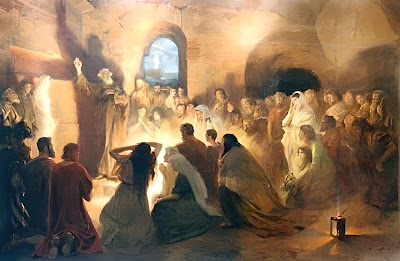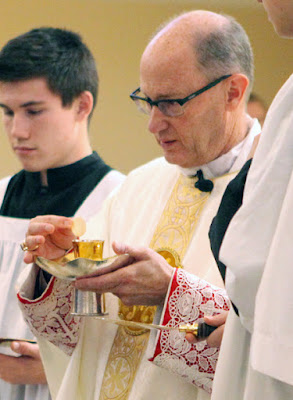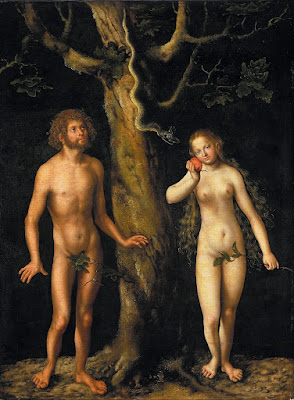Tuesday, December 26, 2023
"Caught Up in Love": the Catholic "Rapture" of Christmas
Sunday, December 17, 2023
Sunday, November 19, 2023
Like a Thief, Like a Fire, Like C.S. Lewis' Dwarfs
St. Paul to the Thessalonians has some scary imagery, but Paul is full of hope. Why? It all comes down to our disposition to God's flaming heart of love and mercy. We can burn or we can be burned.
Monday, November 13, 2023
Ten Virgins, Purgatory, Prayers for the Dead
Yesterday's sermon on dying: What we do for the living, how should we understand Purgatory, the origin of indulgences, and prayers and Masses for the Dead.
Sunday, November 5, 2023
Beauty And Reverence
Sermon about how loving and using beauty and reverence isn't remotely against the gospel call to humility, simplicity, and care for the poor. Star-witness St. Francis of Assisi takes the lead, as he did back in 1200 A.D. when he led the original Eucharistic Revival (see here and here and here). I'm including pictures of St. Joseph's in 1970 and today, not to wag any fingers (I think the parish in the last 20 years has done great work to recenter Jesus and make a beautiful church) but because I specifically mentioned the original detail work being turned to a beige ocean. Also, the 5:30 Mass missed the story that's on here now at 19:45, so I want to draw attention to that.
Sunday, October 8, 2023
Vineyard Restored, Vindication Of The Son
The parable of wicked tenants and the vineyard is told as a prophecy and a promise, not as a perennial life lesson for all people. For us today it is a lesson about how Israel is God's family, but how God also reconstituted Israel around Jesus, who is both the murdered Son and the rejected Cornerstone of the story. After the vindication of the Stone in the Resurrection, the vineyard (God's family) is under new management, the Son, and not under the tenants anymore. The people of Israel are still invited back into the vineyard, but with the new badge or passcode*, for there is "salvation for everyone who believes, the Jew first and then also the Greek." (Rom 1:16)
The horrific news out of the Holy Land this weekend, and the horrors that have afflicted that region for years, remind us of real, physical struggles that have marred the Promised Land for millennia. These were contests about land, ethnicity, power, independence, historic rights...the very concerns on the minds of many visitors to Jerusalem during that first Holy Week. We always must "pray for the peace of Jerusalem." (Psalm 122) But love and solicitude for the people living "between the Sea and the River" must not make us uncomfortable to tell the story of Jesus, the Jewish Messiah, for the Prince of Peace and His family are the greatest hope to end discord in our world, even two thousand years later.
* “Therefore let all the house of Israel know for certain that God has made Him both Lord and Christ, this Jesus whom you crucified.” Now when they heard this, they were pierced to the heart, and said to Peter and the rest of the apostles, “Brothers, what are we to do?” Peter said to them, “Repent, and each of you be baptized in the name of Jesus Christ for the forgiveness of your sins; and you will receive the gift of the Holy Spirit. For the promise is for you and your children and for all who are far away, as many as the Lord our God will call to Himself.” (Acts 2:36-39)
Sunday, October 1, 2023
The Kenosis Creed
Good Friday before Easter Sunday. Crucifixion before Resurrection. Fast before Feast. Darkness before Light. Weeping before Rejoicing. Death before Life.
These pairs, and their this-before-that emphasis, sum up the Christian mindset on many things. They also contain (implicitly or explicitly) the sum of the good news, which we call the kerygma, the distilled and powerful proclamation of the apostles: "For I handed down to you as of first importance what I also received: that Christ died for our sins according to the Scriptures, that He was buried, and that He was raised on the third day according to the Scriptures."
Philippians Ch. 2 adds more terms to the pairs: Humility before glory, debasement before exaltation, human scandal before divine vindication. It also takes the kerygma and widens the timeline of cross-before-crown. An eternal God surrendering his majesty and emptying himself, becoming a weak baby and a crucified rebel, but his Father loving the Son's humility and sacrificial love, exalting him not just in time and on earth, but for ages unending throughout the whole universe.
And while St. Paul is telling the story of the paschal mystery, he ends up giving us a creed as well, the Creed of Kenosis, a tableau of a self-denying diety as proof of God's power, of a Father glorifying a Son for his abject defeat. This, he says, is the inner life of God. Paul pens a creed, proclaims a scandal, and tells his dearest companions to imitate that scandal because they cling to that creed.
(The last part is me wrapping this back around to our annual appeal to support our seminarians, in case that part is confusing.)
Sunday, September 17, 2023
The Bigness of Your Forgiveness
The first lines of the my recording are a little weird because I was making an announcement that because it's the 3rd Sunday of the month we would have Exposition, Adoration, and Confessions at the end of Mass, and I realized that was a really good segue way into the homily and hit record. So the recording catches the segue, but not the first lines of the announcement itself.
Oh, and here's a link the Fr. Mike Schmitz video on forgiveness that I ended with.
Sunday, August 20, 2023
The Jews and Jesus
A family tragedy. A rending of God's own people. One story, one plan, one covenant, one arc, and yet by the end of the first century two families stand apart, both seeing themselves as the heirs of Abraham, and with chips on their shoulders. Centuries of distrust would follow.
How did we get here? Where do we go now? God clearly didn't want this. But (aside from a bare allowance of free will), did God allow this fracture so that other things might come of it, which He could use? We ponder it now, but Paul was already asking these questions in the 50s A.D. The question of Israel and Jesus wasn't his only topic in Romans, but a huge part of that letter is: God's Plan, Abraham's family, the triumph of Israel's messiah, and what does that mean for both Gentiles and Jews.
The Canaanite woman reminds us that the Gentiles had to have some eventual place in God's plan and Romans 11 reminds us that Israel still has its role in the plan too.
Sunday, August 6, 2023
Peter's Transfiguration: He Says Less, But Also More
On Saturday night I covered in Palmyra, Nebraska for my classmate, Fr. Sean Kilcawley. Because Sunday was August 6th, the Mass that evening was for the Feast of the Transfiguration. One cool benefit of having the feast on a Sunday is that, opposed to merely the gospel of Transfiguration as found on the 2nd Sunday of Lent, you get Peter's first-person account of it from his epistle too, and also the "Son of Man" prophecy from Daniel, which was the central text of all messianism in the final centuries leading up to Jesus.
Sunday, July 30, 2023
Paul, We Have Some Questions...
Paul claims that "God makes all things work for the good of those who love Him." But life seems contradict that. Hard.
Why did I miss my flight? Why did I lose that job? Why did God allow this person hurt me? Why did that child die? Why doesn't God take away my temptations, addictions, and weakness?
So, Paul... we have some questions.
Sunday, July 9, 2023
Sunday, July 2, 2023
The Death of the King
Homily for the 13th Sunday, Year A. On the Letter to the Romans, Chapter 6:
Sunday, June 18, 2023
While We Were Yet Enemies
I covered Masses this weekend in Exeter and Milligan, Nebraska (pop. 514 and 241 respectively) and it was fun. But all the same, I made them take out their missals and follow along on page 202 for the 2nd Reading because, well, I'm a one-trick pony.
Jesus commands us, "Love your enemies and pray for those who persecute you." Well, St. Paul thinks it's pretty lucky for us that God practices what he preaches. In Romans 5 today, Paul reflects that when we were still enemies of God, it was at that time that Christ died for us.
Enemies. Ungodly. Sinners deserving of wrath. Thus does Paul describe us all. And to drive the point home he does grudgingly admit that maybe, just maybe, one might rake together enough courage to die for a really good man. Here I think Paul is referencing a well-known heroic story from the Greco-Roman world when he grants them this possibility. But all of that was just so Paul would be able to say, "And we weren't anything even close to that level of good people, or to being that kind of good friend." If I'm right about Paul thinking of that heroic story at this moment, then it's all the more fitting that Jesus followed up his call to love our enemies by noting that if you only love your friends, what's impressive about that? even the pagan Gentiles love their people that much.
Paul can be deep, or clever, or poetic, or culturally savvy. But in this handful of verses, he is all four.
Sunday, June 11, 2023
The Corpus Christi 5-Minute Homily Deal
You may have heard about this multi-year Eucharistic Revival that the U.S. Bishops have called for. You may be aware that parishes have been asked to raise the bar on their Sunday worship and to offer more special, Eucharistic moments—the unique, the devotional, the communal, the less frequent now but formerly universal kind. An event that ticks all those boxes and is specially connected to today's feast is the parish Corpus Christi procession, an almost-ubiquitous annual ceremony of bygone summers with less-busy weekends.
Here in Beatrice, we desired to have a procession at each of the weekend Masses, even if all but one of them would be just by the ministers through the aisles of the church. But that idea can daunt your Mass-goers if they sense that Mass is about to lengthen by 25%. So, Father Kosch and I discussed things and last Sunday he presented the parish with a "grand bargain": We would get the processions built into all Masses this weekend and in exchange the pew-sitters (and their tail bones) would get a guaranteed five minute sermon. And as the name of this blog suggests, I can put about eight minutes of words in five minutes of verbal vortex. If you're looking for in-depth reflections, click here for a four day series on the Eucharist I did in Indiana during Lent. If you're looking to listen to something while you wait in the drive through lane, click the play button below.
(Full transparency: the actual record times were 5:20, 5:05, and 5:13. 🤭 Oops.)
Sunday, May 21, 2023
St. Peter, as a Pastor
There are two distinct versions of this homily, both linked below. The first one is a "remix" of sorts, in that it was preached at the Sunday 8am Mass which was also our Mass for our high school graduates, and therefore was addressed to them first and foremost. The other is the "vanilla" version that was at 5:30 and 10:00 Masses.
Interestingly (maybe?), that was the order of their inspiration too. Usually you would pick a topic and come up with a broad homily for the whole of the parish and then add little touches to make it fit the special occasion better. But that seemed dangerous: you've got eighteen-year-olds in the front row, their immediate families, and perhaps extended family and friends, some of whom might not be Catholics, and all are probably looking for some direct relevance to the situation.
So I approached it as: Let's find a topic "that'll preach" for graduates, and then reverse-engineer it so it fits the other congregations too. And while today's gospel is gorgeous, it's also a little confusing. The practical side of things seemed a better fit. And no letter is more practical than 1st Peter (except maybe James). And reading throughout this Easter season Peter's consistent message of undaunted grace in times of severe trial was perfect, a no-brainer for kids leaving home and for everybody else's life besides.
Graduate Mass:Sunday, May 14, 2023
Holy Spirit: Agent, Advocate, Ally
Both this Sunday's readings and my homily pick up right where they left off last week. All are continuous: Acts of Apostles last had Stephen and the deacons being commissioned, and now Deacon Philip is in Samaria as they move out after Stephen was killed. 1st Peter is one chapter later. And Jesus picks up again just two lines later in John 14 at the Last Supper.
Last week Jesus focused on opening up the relation of the Father and the Son. And so the focus of the homily was on them and how to picture their orientation toward each other and their distinct roles toward us. This week Jesus talks a lot about how he will ask the Father, and the Father will send the Advocate to them in Jesus' name. So this homily explains, first, what the Spirit does for us and, second, how the Christian life is about us being inserted into the inner workings of the Trinity: Being incorporated into, and united with, Jesus. Loving and serving the Father because we are ourselves in the Son. The Spirit freeing us and then fusing us to Jesus, and us going out in the power of the Spirit to preach, serve, and strive, with confidence in the Spirit's aid.
Sunday, May 7, 2023
Jesus: Road, Ferry, Telescope
The disciples Philip and Thomas get feature roles in John chapter 14, as Jesus uses their comments as springboards to take us deep into the heart of God, into the inner workings of the Trinity. This gospel reading for the 5th Sunday of Easter is probably the single most important text for the Christian doctrines of Incarnation and the Trinity. And while the teaching can still contain mysteries for our minds, Jesus gives us great images by which to start to understand the three Persons.
Monday, April 24, 2023
Ransoming, Redeeming, Retelling
Jesus is himself the first person to retell the story of Israel with his death and resurrection at its center. Peter, both in Acts and in his First Letter, retells that story too. And although the Bible never explains how exactly Jesus' death saves us, it regularly uses the word "ransom" to describe Jesus' death on the cross. And more often than not the words that we read in English as "redeem, redemption" are really the same Greek word as "ransom". Even though we often tend to lump our "redeeming" with words like "forgiving" or "satisfying" or "rescuing", it first and foremost is buying word, a marketplace word, a word for trading away your costly valuables to release an enemy's victims from their slavery. And that is a favorite image of the first Christian centuries: giving up a Son to free us slaves.
O wonder of your humble care for us!
O love, O charity beyond all telling,
to ransom a slave you gave away your Son!
O truly necessary sin of Adam,
destroyed completely by the Death of Christ!
O happy fault that earned so great, so glorious a Redeemer!
Thursday, April 6, 2023
"The Blood of Jesus Purples Our Lips"
For our Holy Thursday Mass tonight we had Communion by intinction. Meditating on that word. "intinction", I remembered the above quote from St. Peter Julian Eymard from the wonderful book The Real Presence.
So I invite you too to meditate on the imagery of the Body of the Lord, tinged with His Blood, given to the faithful. In the words of The Letter to the Hebrews, Chapter 10: “We have confidence to enter the Holy of Holies by the blood of Jesus, by the new and living way that he inaugurated for us through the veil, that is, his flesh.”
(Also, how great is it that when I searched Google for an intinction picture, the first image was of our own Bishop James Conley distributing Communion.)
Sunday, April 2, 2023
Matthew's Lost Last Supper
Sure, at Mass we are constantly reminded of the Last Supper, but we actually rarely hear the story. And when we do, it is all but drowned out by the subsequent events of the passion. So let us turn our eyes to Matthew's narration of it and see Jesus offer Israel a "system update": the rollout of Covenant 2.0
Friday, March 24, 2023
The Eucharist: A Parish Mission In Two Senses
March 18-22 I was blessed to be able to offer a four-day Lenten parish mission at my parents' church, St. Louis de Montfort in Fishers, Indiana.
Their pastor, Fr. Thomas Haan, invited me as part of the parish's ongoing renewal and encounter with Jesus, and especially with Him in the Blessed Sacrament, in anticipation of the Eucharistic Congress hosted by Indianapolis in 2024.
I preached the weekend Masses as a preview, and then gave spiritual conferences on three topics the following days, once in the morning and once in the evening.
Mass Homily: The Treasure and the Revival
Sunday, February 26, 2023
We are Broken; God's Mercy is Greater
The 1st Sunday of Lent hits you pretty hard with the sinfulness of man, leading off with Genesis 3 and Psalm 51. In some circles, St. Paul gets critiqued as being negative, dour, or moralistic, but his 5th chapter of Romans that we hear right after that is the definition of good news. The gift is not like the transgression; the "physics" of sin are not like the dynamic of grace. Truly, there is a wideness in God's mercy.
There are definitely a lot of personal stories in this one. This week I was thinking about how when you have a retreat day or a witness talk, you don't get convicted by hearing the theology of sin, you get it from hearing a person's stories and having that resonate with your own brokenness. So, we still have to be nerdy with Romans 5 a bit, but theres some big stories in there too.
Monday, February 20, 2023
2 Homilies: Lessons from Septuagesima. Waiting for the Beatitudes.
So, here's two homilies. The first up is from just yesterday, about these last few days before Lent.
The other one is actually from January 29, the start of Catholic Schools Week, but I started showing Covid symptoms that night and was a salted slug the next 10 days and never posted it.
Monday, January 16, 2023
Posting Homilies Again. Here's Three of Them.
One of my goals for 2023 was to get back in the habit of posting homilies. We're now halfway through January so I suppose I should get around to that. Here are the homilies for January 1st, 8th, and 15th.
January 1: "Octaves, Sheriffs, and Posses"
January 8: "Christmas Wasn't Really Meant For You"
January 15: "What Lambs Don't Do"

























